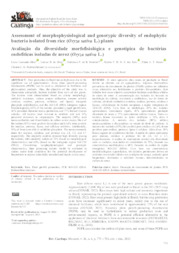Assessment of morphophysiological and genotypic diversity of endophytic bacteria isolated from rice (Oryza sativa L.) plants.
Assessment of morphophysiological and genotypic diversity of endophytic bacteria isolated from rice (Oryza sativa L.) plants.
Resumo: Rice production in Brazil incurs high costs due to the significant use of agrochemicals. Some plant growth-promoting rhizobacteria (PGPR) can be used as alternative to fertilizers and phytosanitary products. Thus, the objective of this study was to characterize endophytic bacteria isolated from roots of rice plants. The isolates were characterized based on colony morphology, antibiotic resistance, carbon sources utilization, enzyme activity (catalase, amylase, protease, cellulase, and lipase), inorganic phosphate solubilization, and the 16S-23S rDNA intergenic region. Morphologically, 68% of the isolates presented a rapid growth rate, 46% presented abundant mucus production, and 77% formed viscous colonies. All isolates were resistant to nalidixic acid and 16% presented resistance to streptomycin. The majority (90%) used monosaccharides and disaccharides in carbon source assays. Most of the isolates (95%) were positive for catalase and 63.6% were positive for amylase, protease, lipase, and cellulase activities. Additionally, 59% of them were able to solubilize phosphate. The mean enzymatic index for amylase, cellulase, and protease was 2.8, 3.5, and 1.7 respectively. The similarity analysis revealed high diversity among the isolates, with similarity indices of 70% (based on morphological characteristics) and 60% (based on the intergenic region 16S-23S rDNA). Considering morphophysiological and genotypic characteristics, three promising isolates should be evaluated in studies under field conditions for the potential development of bioproducts to replace industrially manufactured inputs in rice crops.
Ano de publicação: 2023
Tipo de publicação: Artigo de periódico
Unidade: Embrapa Arroz e Feijão
Observações
1 - Por padrão são exibidas publicações dos últimos 20 anos. Para encontrar publicações mais antigas, configure o filtro ano de publicação, colocando o ano a partir do qual você deseja encontrar publicações. O filtro está na coluna da esquerda na busca acima.
2 - Para ler algumas publicações da Embrapa (apenas as que estão em formato ePub), é necessário ter, no celular ou computador, um desses softwares gratuitos. Sistemas Android: Google Play Livros; IOS: iBooks; Windows e Linux: software Calibre.
Acesse outras publicações
Acesse a Base de Dados da Pesquisa Agropecuária (BDPA) para consultar o acervo completo das bibliotecas da Embrapa.

